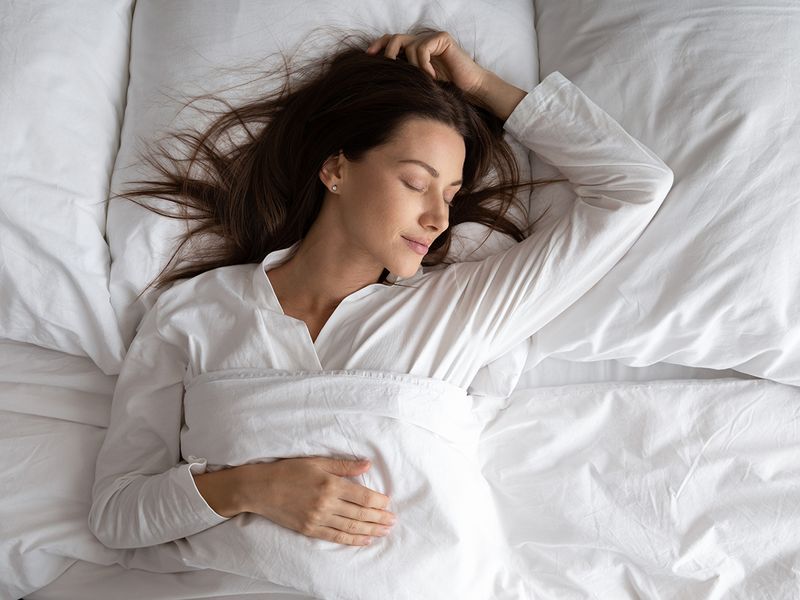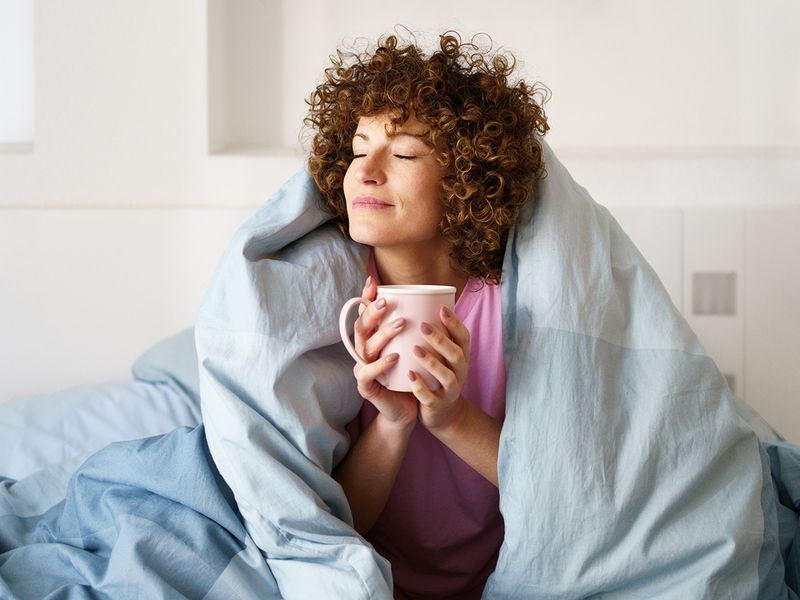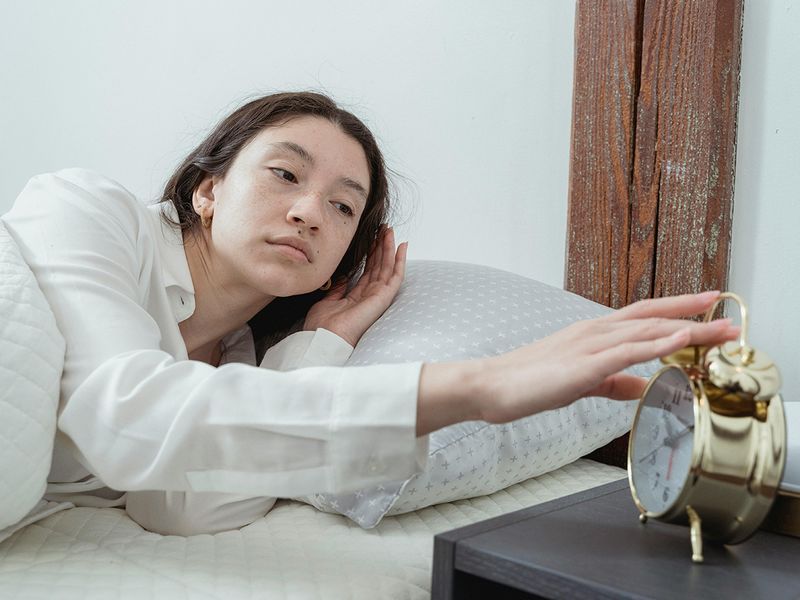
Natural light increases serotonin levels, which helps you feel alert and awake. Higher levels of serotonin are also linked to improved mood, reduced anxiety and a sense of well-being.
Image credit: Shutterstock
Sure, sunlight gives your plants a healthy glow, but for you, it does something even more important — it regulates your sleep cycle.
You need that exposure to sunlight in the morning, explains Julie Mallon, a sleep specialist based in Dubai. Sunlight is not the only source of vitamin D; it regulates the body’s natural clock, which is known as the circadian rhythm. This cycle regulates when we feel sleepy or alert. So, consistent exposure to sunlight can help our systems identify when it’s time to wake up. A sunny day gives us that boost of energy, which is essential for maintaining the body’s biological clock.
So start your day by exposing yourself to natural light for at least three minutes before using your phone. “Exposure to morning light improves mood, energy levels and sleep quality by strengthening the circadian rhythm,” says Mallon. When you wake up and feel the sun’s rays, your body knows it’s time to be awake. This helps suppress the production of melatonin, the sleep-regulating hormone, and boosts your energy levels naturally.
Exposure to natural light is essential for regulating our circadian rhythm. So start your day by exposing yourself to sunlight for at least three minutes before using your phone. Exposure to morning light improves mood, energy levels and strengthens the circadian rhythm…
– Julie Mallon, sleep specialist, Dubai
According to the 2019 study Effects of Light on Human Circadian Rhythms, Sleep, and Mood, published in the US-based National Library of Medicine, natural light also increases serotonin levels, which help you feel alert and awake. Higher levels of serotonin are also linked to improved mood, reduced anxiety and a sense of well-being.
So, in moderation, a little sunlight peeking through the window is a good way to wake up. Try using sheer curtains or opening the shutters slightly to let the first rays of light into the room, she suggests. You can also buy smart bulbs that will slowly get brighter, according to the time you set. As the bedroom gradually becomes brighter, the lights slowly bring a person out of sleep. It is much less disturbing than suddenly turning on the lights and filling the room with bright light.
Scent burst… coffee anyone?

Pleasant smells will remind you of better experiences and memories, causing the release of dopamine, which promotes feelings of motivation and alertness.
Image credit: Shutterstock
Freshly brewed coffee. Aromas of mint and citrus oils. These slowly induce you to wake up and provide you with a sense of relaxation and comfort. Deepthi Menon, a Dubai-based homemaker, soaks a cotton ball with essential oils and then places it near a window. “As the air circulates, it carries a very uplifting aroma throughout the room. I always feel better after waking up with this scent; it puts me in a good mood,” she says.
There are scientific reasons behind this. “When you inhale a pleasant scent, the odor molecules travel through your nasal cavity and bind to receptors in your olfactory system,” explains Diya Aggarawal, a sleep specialist based in Dubai. “This sends signals to your brain, particularly the limbic system, which is involved in emotion, memory and arousal. Certain scents such as lavender and citrus increase alertness and focus, which makes it easier to overcome drowsiness,” she adds.
Moreover, some scents are filled with nostalgia. So pleasant smells will remind you of better experiences and memories, triggering the release of dopamine, which promotes feelings of motivation and alertness, she adds. Such aromas contribute to a refreshing and soothing atmosphere. So you feel relaxed and ready to start the day.
However, a 2004 study by US-based researchers published in the journal Sleep concluded that smell may not be an effective way to wake up as our perception of smell during sleep is minimal.
Nice sounds
How about some soft, melodic tunes, soft, upbeat pop or natural sounds with chirping birds?
According to a 2020 study by University of Melbourne researchers published in PLOS One, a journal from the US-based Public Library of Science, melodic sounds were associated with a significant reduction in sleep inertia. This includes songs such as ‘Good Vibrations’ by the Beach Boys or The Cures ‘Close to me’. The researchers observed that the music helped reduce the feeling of sleep inertia, which is a state of low mood, low energy and poor thinking skills immediately after waking up.
As Aggarwal says, the right song or style of music can be especially helpful in waking someone who is often groggy or bored by the sound of their alarm clock.
Why alarm clocks are not the answer

We should wake up without alarms. Although it may sound unrealistic, in an ideal scenario, we should wake up naturally after getting enough sleep.
Image credit: Shutterstock
This relentless, annoying noise can be enough to put you in a bad mood for the rest of the day.
As psychologists explain, loud alarms don’t wake us up naturally. You wake up suddenly, to a loud sound, and this results in an increase in adrenaline secretion, explains Lavina Ahuja, clinical psychologist at the German Neuroscience Center in Dubai. It’s our ‘fight or flight’ response that speeds up our heart rate and raises our blood pressure – and when our slow, sleeping heart suddenly kicks into action, it puts a strain on our cardiovascular system.
You find yourself waking up suddenly from deep sleep stages, which leads to increased sleep inertia, resulting in impaired cognitive function that lasts after we transition from sleep to wakefulness, says Syed Arshad Husain, consultant pulmonologist at King’s College based in Dubai. The hospital’s sleep medicine clinic had earlier told Gulf News. “This can lead to not being refreshed and not performing well or feeling lethargic and tired. Their concentration may not be good and they may feel quite restless and unhappy in the morning. That’s why I think it’s important that they wake up in a way that they don’t feel these in the morning – it affects good health and well-being, especially in how you behave, how you interact, how you focus on doing things. .”
Ahuja elaborates, “It’s harmful if the alarm clock wakes you up in a deep sleep state, as you wake up feeling groggy and disoriented, which can affect your memory and cognitive abilities. Hitting the snooze button on repeatedly makes this all the more worse.—so try to minimize the number of alarms you set or the number of times you hit snooze,” she says. “Change the alarm tone to soft or songs or sounds inspired by nature, as it can help you wake up in a more relaxed way.”
Ideally, we should wake up without alarms. Although it may sound unrealistic, in an ideal scenario, we should wake up naturally after getting enough sleep.
It is harmful if the alarm clock wakes you from a deep sleep state, as you wake up feeling groggy and disoriented. This can affect your memory and cognitive abilities. Hitting the snooze button repeatedly makes this all that much worse – so try to minimize the amount of alarms you set or the number of times you hit snooze…
– Lavina Ahuja, clinical psychologist, German Neuroscience Center, Dubai
Hady Jerdak, CEO and specialist in internal medicine, pulmonary diseases and sleep disorders at Abu Dhabi-based Harley Street Medical Center, had earlier told Gulf News, “Someone who sleeps well does not need any alarms. You need to make sure you get enough sleep and if you do, you don’t need alarms. Your biological clock will wake you up – if you go to sleep at 10pm, you’ll wake up around 6am. “
For this, sleep hygiene and sufficient shut-eye is important. Aggarwal explains the best way to sleep regularly and effectively. Make sure the room is completely dark and remove phones and other screens. Mallon explains why this is necessary: Artificial light from your phones or screens suppresses melatonin and keeps you awake and alert, leading to disrupted sleep patterns. And so, sleeping in a dark room and waking up with natural light is what your body needs.
With input from Sahar Ejaz, Special to Gulf News
#Remove #alarm #Wake #naturally #sunlight #fragrance
Image Source : gulfnews.com

